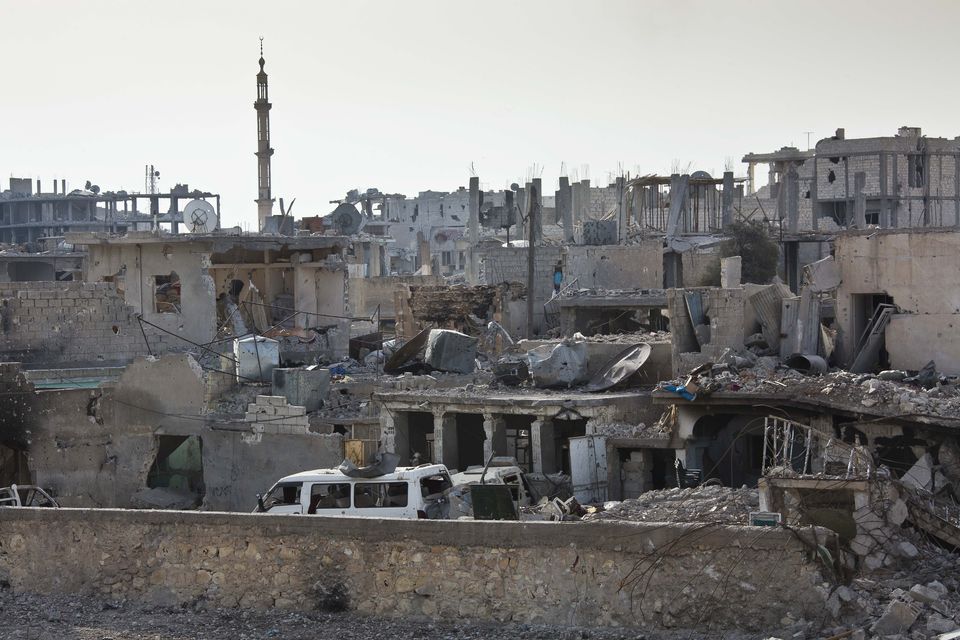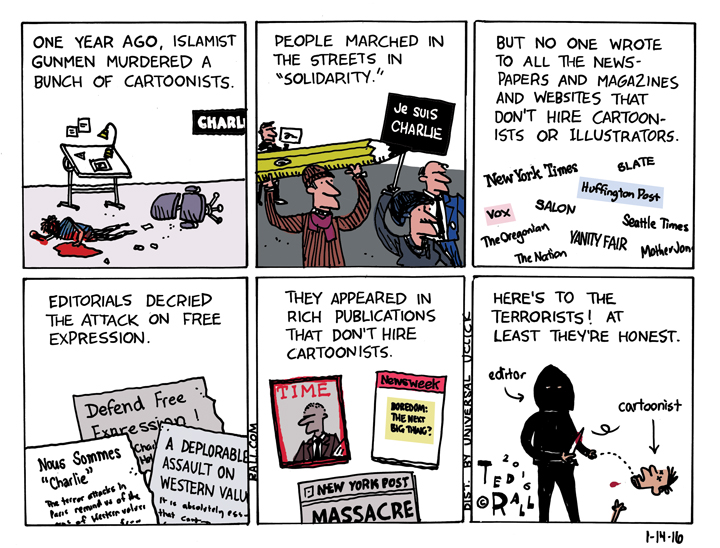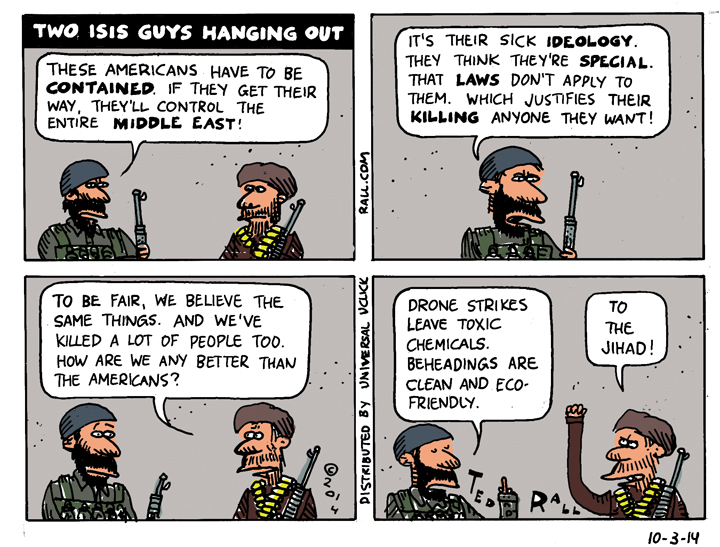One year after the massacre at Charlie Hebdo, political cartooning is under more threat than ever. But the real threat is job cuts and editors who refuse to hire cartoonists, not terrorists.
SYNDICATED COLUMN: Why Are We At War with ISIS?

Is there any justification at all for bombing ISIS?
There isn’t any Congressional authorization, much less a declaration of war. Is there even a good reason for the U.S. to be involved?
There is no better time to ask this question than now, as much of the world (me included) is disgusted by the Islamic State’s beheadings of two kidnapped Japanese nationals, the second one an acclaimed journalist and humanist who lost his life trying to rescue the first.
It is easy to forget, too easy, that for Americans going to war was until recently an act undertaken only after every other alternative had been thoroughly explored and completely exhausted, that the bar for casus belli was high, and that war wasn’t the standard response to outrage or international crisis, but quite unusual, a deviation from the normal order of business. Hard to imagine now, but the United States did not declare war against Germany after its U-boat torpedoed and sank the RMS Lusitania in 1915, killing 1,198 passengers, including 128 Americans. Instead, President Woodrow Wilson demanded compensation and a promise from Germany not to do it again.
War has since become much too easy.
We go to war fast, without national discussion — much less debate. We go to war indiscriminately. We war against several nations (Afghanistan, Iraq, Libya, Syria), at the same time we’re warring against a tactic (terrorism), as well as various so-called “non-state actors” (discrete branches of Al Qaeda, Khorasan, Abu Sayyaf). War, war, war, all the time. So much war we think it’s normal that, especially when someone/something/some group does something we deem wrong, like slitting the throats of reporters as GoPros record the bloodshed in glorious high resolution, war is the knee-jerk response.
Yet, as the Lusitania example reminds us, this was not always the case, and so this is not how it necessarily must be.
In just one single day over the past weekend, the U.S.-led coalition carried out 27 airstrikes against ISIS-held territory in Syria and Iraq. We have no way to know how many ISIS soldiers, and civilians, were killed or wounded in those bombardments.
U.S.-led forces are responsible for at least 16,000 airstrikes against ISIS in the last six months, killing an unknown number of people — but guesstimates logically begin in the tens of thousands, including civilians. Despite all that carnage, the air campaign has not had the desired effect: ISIS is stronger than ever, continuing to conquer new territory and consolidate control over old ground, and the authoritarian government of Syrian President Bashar al-Assad, an adversary of the U.S. its ally Israel, is benefiting as well.
American war officials concede that the air war is failing. “I think [the war against ISIS] may require a forward deployment of some of our troops,” U.S. Secretary of Defense Chuck Hagel told CNN. “I would say we’re not there yet. Whether we get there or not, I don’t know.”
“This is going to be a long, nasty, dirty war that in many ways is going to look a lot like the first go-around in Iraq,” Stephen Biddle, ex-adviser to Army General David Petraeus, told U.S. News & World Report.
But…why?
Why are we in this “long, nasty, dirty war” against ISIS?
Why aren’t we asking why we are at war against ISIS?
No one is arguing that the Islamic State is run by nice people. ISIS has carried out ethnic cleansing, enslaved women, raped children, slaughtered POWs in summary executions and Talibanized areas under their control, imposing their brutal, brutal medieval version of Sharia law on citizens accustomed to modern life under socialist, secular states.
But ISIS is not alone in its barbarism.
Saudi Arabia routinely carries out public beheadings and floggings, as well as crucifixions, and treats women like dirt. Yet we don’t bomb them. To the contrary, the Saudis are close allies. President Obama cuts short important diplomatic trips in order to join the Saudis as they mourn their dead king.
Another close U.S. ally, the government of the Central Asian republic of Uzbekistan, either boils or freezes political dissidents to death, depending on the government’s mood. Quirky! No air raids there either.
Among the worst nations on earth for human rights abuses are Yemen and Pakistan, both of which like ISIS are fundamentalist Islamist regimes, but receive hundreds of millions of dollars in American weapons and cash.
So what’s special about ISIS? Why did we go to war against them?
“When it comes to human rights abuses, they (Islamic State militants) are in a class of their own,” Senator Barbara Boxer (D-CA) said last summer in support of a Congressional resolution supporting America’s newest war. But that’s not true. ISIS is no worse than any number of other regimes we choose to leave alone (or actively support).
The New York Times’ editorial board says ISIS “poses a dire threat to the United States and its allies.” How so? They can’t attack the U.S. Yes, they’re in Iraq, which we kinda sorta view as an ally after invading it, but that war was lost in 2003. ISIS can’t invade Israel. So why are we attacking them? And why aren’t we asking why?
War is serious business. It takes lives, costs money, destroys infrastructure and the environment, and creates new problems, including laying the ground for future wars. The least — the very least — we can do is think about it, and talk about it, before starting one, and then letting inertia carry it on.
(Ted Rall, syndicated writer and cartoonist for The Los Angeles Times, is the author of the new critically-acclaimed book “After We Kill You, We Will Welcome You Back As Honored Guests: Unembedded in Afghanistan.” Subscribe to Ted Rall at Beacon.)
COPYRIGHT 2015 TED RALL, DISTRIBUTED BY CREATORS.COM
Guest Post: Obama’s Speech.
Susan here. This is a quote from Obama’s speech:
“To my friends on the left, I ask you to reconcile your belief in freedom and dignity for all people with those images of children writhing in pain, and going still on a cold hospital floor. For sometimes resolutions and statements of condemnation are simply not enough.”
My response is this:
Fuck you, Obama. Fuck you for trying to come to us on the Left when you need us, and then shitting on us when you don’t. You do NOT have my permission to bomb Syria, and you will NEVER get it. You will NOT get my permission to bomb Syria based upon a YouTube video that conveniently surfaced just as the UN weapons inspectors were checking into their Damascus hotel. There are hundreds of videos of the so-called Syrian opposition al-Qaeda “rebels” committing atrocities like beheading Christians, practicing cannibalism, and sawing a little girl’s arms and legs off while she is still alive. And yet, we are supposed to ignore these atrocities and focus on the one (conveniently-timed) atrocity that Assad would never actually be stupid enough to commit.
I am tired of your patronization. I am tired of your lies. I am tired of looking at your face. I am tired of hearing your voice. And I’m tired of you trying to soften up Syria for the kill, and slouching us inch by inch into World War III. Because unlike Libya in 2011 and Iraq in 2003, Syria has allies, allies who are likely to retaliate. If Iran retaliates, the price of oil will go sky high, and we will freeze in winter-time, and the price of just about every product will go up due to the higher cost of shipping. Because 50% of the world’s oil comes from the Persian Gulf. I shouldn’t have to tell you this, Mr. Obama. That’s what you pay that useless Cabinet of yours to do.
But since you did address Leftists such as myself in your speech, I will tell you this: The US used chemical weapons in Vietnam (Agent Orange), and used them again in Iraq and Afghanistan (White Phosphorus, Depleted Uranium). So we are in NO position to lecture others on the use of chemicals as weapons. People who live in glass houses shouldn’t throw stones.



